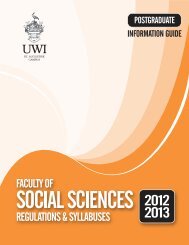Faculty of Humanities and Education (Postgraduate) - The University ...
Faculty of Humanities and Education (Postgraduate) - The University ...
Faculty of Humanities and Education (Postgraduate) - The University ...
Create successful ePaper yourself
Turn your PDF publications into a flip-book with our unique Google optimized e-Paper software.
POSTGRADUATE REGULATIONS & SYLLABUSES 2012 - 2013<br />
THE FACULTY OF HUMANITIES & EDUCATION<br />
YEAR:<br />
SEMESTER:<br />
COURSE CODE: EDSC 6003<br />
COURSE TITLE: ASSESSMENT IN SCIENCE<br />
NUMBER OF CREDITS: 4<br />
COURSE DESCRIPTION:<br />
Rationale<br />
Contemporary educational reform initiatives are forcing us to<br />
take a second look at what constitutes‘good’science education.<br />
Research from cognitive psychology has influenced the way we<br />
look at teaching <strong>and</strong> learning <strong>of</strong> science, <strong>and</strong> recognition <strong>of</strong> the<br />
importance <strong>of</strong> assessment has resulted in an increased interest<br />
in research, development, <strong>and</strong> implementation <strong>of</strong> new methods<br />
<strong>of</strong> assessment in science.<br />
<strong>The</strong>re has been a shift in focus to include not only measurement<br />
<strong>of</strong> science content knowledge, but the processes <strong>of</strong> science <strong>and</strong><br />
attitudes to science. In addition, greater emphasis is placed<br />
on formative assessment <strong>and</strong> its role in providing feedback to<br />
improve science teaching <strong>and</strong> learning.<br />
This course provides the opportunity for science educators<br />
to become familiar with the cognitive theories that underpin<br />
learning <strong>and</strong>, by extension, the processes <strong>and</strong> purposes <strong>of</strong><br />
assessment in science; to plan, design, implement, <strong>and</strong> evaluate<br />
a range <strong>of</strong> assessment strategies that measure all aspects <strong>of</strong><br />
science achievement; <strong>and</strong> to make assessment decisions that<br />
support quality science instruction, while providing meaningful<br />
feedback that can guide their own pr<strong>of</strong>essional development<br />
<strong>and</strong> enhance students’ underst<strong>and</strong>ing <strong>of</strong> science.<br />
OBJECTIVES<br />
At the end <strong>of</strong> this course, participants will be able to:<br />
• apply principles <strong>of</strong> cognition <strong>and</strong> learning to science<br />
instruction <strong>and</strong> assessment<br />
• demonstrate underst<strong>and</strong>ing <strong>of</strong> the purposes <strong>of</strong> assessment<br />
(formative, summative, <strong>and</strong> diagnostic) as they relate to<br />
science teaching <strong>and</strong> learning<br />
• develop competencies in planning, designing, <strong>and</strong><br />
implementing a range <strong>of</strong> assessment strategies in science<br />
that mirror sound instructional practices<br />
• incorporate on-going assessment strategies into the<br />
teaching/learning <strong>of</strong> science that accommodate students’<br />
abilities, while meeting curriculum goals<br />
• use information from assessment to improve practice <strong>and</strong><br />
enhance student learning <strong>of</strong> science<br />
CONTENT<br />
• Important trends in assessment – theoretical perspectives<br />
<strong>and</strong> implications for science teaching, learning, <strong>and</strong><br />
assessment<br />
• Current theories about learning<br />
• Overview <strong>of</strong> research on assessment issues in science<br />
• Equity issues<br />
• Contextual issues (beliefs, cultural practices, language)<br />
• Purposes <strong>of</strong> assessment in science education in a Caribbean<br />
context<br />
• Assessing for learning - reporting knowledge, using<br />
knowledge, <strong>and</strong> creating knowledge<br />
• What to assess? Nature <strong>of</strong> science, concepts <strong>of</strong> science,<br />
processes, skills, values <strong>and</strong> attitudes, <strong>and</strong> ability to<br />
communicate science<br />
• When to assess? Formative, summative, <strong>and</strong> diagnostic<br />
assessments<br />
• Assessment formats – How to assess?<br />
• Structures, kinds <strong>of</strong> information provided, uses, <strong>and</strong><br />
limitations <strong>of</strong> various formats for assessing science –<br />
graphic formats, performance formats, written formats, <strong>and</strong><br />
observation formats<br />
• Embedded <strong>and</strong> integrated assessments<br />
• Student involvement in assessment – peer <strong>and</strong> selfassessments<br />
• Maximising quality <strong>of</strong> student responses (role <strong>of</strong> questions<br />
in assessing <strong>and</strong> fostering thinking in science)<br />
• Weighting in the various domains<br />
• Planning, designing, <strong>and</strong> implementing science<br />
assessments to support classroom instruction, as well as<br />
local <strong>and</strong> external examinations requirements (SEA, CAP,<br />
SBA, CSEC, CAPE, etc.)<br />
• Targets <strong>of</strong> good assessments<br />
• Matching assessment to science instruction<br />
• Developing assessment tasks in science<br />
• Developing, using, <strong>and</strong> reviewing scoring guides <strong>and</strong><br />
rubrics<br />
• Creating supportive environments for science learning/<br />
assessment<br />
• Issues <strong>of</strong> validity, relevance, <strong>and</strong> reliability<br />
• Collecting, analysing, aggregating, interpreting, <strong>and</strong><br />
describing assessments data in science<br />
• Using feedback from assessments to inform practice <strong>and</strong><br />
improve student learning in science<br />
MAJOR COMPETENCIES TO BE DEVELOPED<br />
• Decision making<br />
• Critical <strong>and</strong> creative thinking<br />
• Independent <strong>and</strong> collaborative problem solving<br />
• Enhanced instructional <strong>and</strong> assessment planning <strong>and</strong><br />
implementation skills in science<br />
• Facility to collect, interpret, describe, <strong>and</strong> use assessment<br />
data in science<br />
131

















